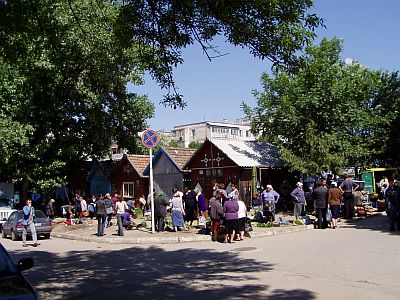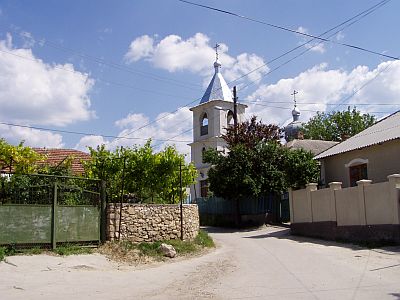Official Name
Orhei. Note that "h" is pronounced as the 'ch' in the Scottish word 'loch' (phon: x). The Russian name, which is still often used, is quite different: Оргеев (Orgeyev). The name should not be confused with one of Moldova's main attraction - the monastery at →Orheiul Vechi (Old Orhei), which is around 20 km away from present-day Orhei. The Jewish name for the town is Uriv.
Location

| ||
| Orhei |
Orhei is around 45 km away north of →Chişinău and stretches along the river Răut, which is eventually flowing into the river Nistru (Dniestr) near Dubăsari. The valley of the river is rather wide in and around Orhei, so that it almost forms a plain.
Population
About 29,600 - the netto growth rate is negative.
Orientation
Orhei is a small town and the agricultural centre of the district. The bus station is conveniently located at the important state road A 253. From the bus station, you will only need to climb a short, steep slope to get to the centre. Walk past the shopping centre and you will get to the green Blvd. Eminescul. When you walk up this road, you will soon see the ugly town hall. There, just turn right onto Str. Vasile Lupu, which is the main road of Orhei, featuring a few shops and a hotel. When you walk along Lupu rd and turn right again after some 500 metres, you will get to the bustling market. There, people from the surrounding villages sell...almost everything. But that's just once in a week.
Getting there / transportation
Almost all buses running from →Chişinău to places in the north stop in Orhei. Which means that it's no problem at all to find a bus or marshrutka from the capital to Orhei until 7 pm. All buses leave from the central bus station. The ride takes approximately one hour, the fare for the minibus is 8.6 Lei (€ 0.60). Buses to →Bălţi need around 2 hours, the fare is 16 Lei (€ 1.2).
There's only one bus a day to →Orheiul Vechi (Old Orhei). And the bus must have been stolen from a museum. It leaves at 12:45 noon. Locals don't use the name 'Orheiul Vechi' very often, so you'll have to look for a bus to Trebujeni. It's not a bad idea to say where you want to get out, our else the bus doesn't stop at the junction to Old Orhei. A taxi driver offered us to bring us there and back for 100 Lei (around € 6). The price is definitely fair, but we refused since we wanted to walk around Old Orhei slowly without having someone impatiently waiting for us around us.
Orhei is the local centre of the Judetul (district) with the same name. Altogether, some 300,000 people live in Judetul Orhei. As almost everywhere in Moldova, most people don't live in the town but in the villages scattered all over the country. Around two-thirds of Moldovans live in cities, but that's only thanks to the capital and a question of how you would define a city. Orhei is just a provincial town, used as an important market place. There's industry at the edge of town with some chimneys - none of them is smoking. According to some locals we've been talking to, there's no work in and around the town.

| ||
| Market day in Orhei |
Thursday is market day in Orhei. Farmers and merchants from all the villages around Orhei gather in the town and sell fruits and vegetables, breeding stock, clothes and many gimmicks more or less useful for the everyday life. The market is quite big and very hectic, it's interesting to walk around and see how the local economy works. By the way - highly popular with the visitors are (living) ducklings. One costs 7 Lei (€ 0.50). The market stretches along Str. Piatra Neamţ.

| ||
| Small, recently restored church in Str. Paghis |
The centre of town is quite spacious and green, but many buildings are decayed. That's the real Moldova - not the modern, booming capital. Although the Palace of Culture and other community buildings are gradually falling apart, there seems to be enough money for rebuilding churches. However, amazingly there are almost no churches outside the centre. By the way - just walk some hundred metres away from the centre and you'll think that you are in a nice, small village.
→Orheiul Vechi (Old Orhei) is one of the main attractions, if not THE attraction of Moldova. It lies around 20 km away from Orhei in the east. Two kilometres west of Orhei, the village of Pelivan sprawls beside the main road to →Bălţi. The village is one of the many places in the country that was founded by German settlers. The centre of the village is a good example of typical socialist rural planning. However, it's sad to see all the communal facilities crumbling. It doesn't come as a surprise. As a matter of fact, an estimated 25% of Moldovans being fit for work are employed outside the country.
Right in the centre, facing Str. Vasile Lupu, there's the grey and dull Hotel Codru. It looks very run-down. Opposite the hotel there's a modern restaurant inside a bright yellow building. The restaurant serves coffee, pizza etc. The quality is...reasonable.
- So far, no website available.
Do you have or do you know a good website about Balti? Don't hesitate, let me know! After checking it, I would love to add it to the link list. You can submit a link by using the →contact form. Note that commercial websites will be treated differently.
©2024 Europe-East.com

 Albania
Albania Moldova
Moldova